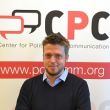Scholar report: Andreas Schuck
In this Erasmus Mundus visiting scholar report Andreas Schuck, University of Amsterdam, reports on his trip to University of Technology Sydney (UTS) from June 23rd to July 14th 2015.

Together with Catriona Bonfiglioni, Elaine McKewon and Tom Morton from UTS, future research co-operations were explored regarding the topic of news coverage of global climate change (its contents and effects) and environmental communication, which we all share a joint interest in.
A first project I investigated concerned the quality of news coverage of global climate change and its effects on citizens for which data in the Netherlands, Australia and the US have been collected in 2015. The main question here was: What are the effects of varying degrees of quality in news coverage on citizen engagement, knowledge and attitudes? And are there relevant country specific differences? Do citizens, for example, learn more when quality of news coverage is high (e.g. information density is high) – but at the same time get less involved with the topic because such coverage is perceived as less interesting or engaging, not to say “boring” (e.g. less focus on conflict or emotions)? In other words, what is “good” coverage not only in a normative, theoretical sense, but from a citizen perspective and in terms of desirable outcomes?
It was very valuable for me to be able to discuss the nature of the media discourse on climate change in Australia
In this context it was very valuable for me to be able to discuss the nature of the media discourse on climate change in Australia with the UTS colleagues and to get further insight into how this topic is discussed nationally. It also became clear that there are striking differences in how the topic is discussed in the US, Dutch and Australian media, meaning that citizens are exposed to quite a different public debate on this topic in these three countries.
Engaging in comparative research by working on joint projects and co-operating between partner institutions is one of the exciting opportunities and benefits of our existing Mundus network. Especially at a time at which comparative research becomes more and more important and relevant the Mundus scholar exchange provides an excellent opportunity to work together with colleagues from different parts of the world and with different methodological and theoretical expertise.
Engaging in comparative research by working on joint projects and co-operating between partner institutions is one of the exciting opportunities and benefits of our existing Mundus network.
I am particularly thankful to Catriona Bonfiglioni and Tom Morton who have been excellent hosts again during my visit and am looking forward to working together. I also learned more about Australian politics - since the national elections took place while I was there - which was very interesting for me as a political communication scholar and I also enjoyed the opportunity to give a guest lecture at the University of Melbourne on the role of emotions in political communication. Overall, this again has been a very fruitful and interesting visit for me and I am looking forward to further working together on our joint research interests.